How Many Hugs Do You Get a Day? Science Says It May Not Be Enough
Touch is powerful—and it's essential to our health.
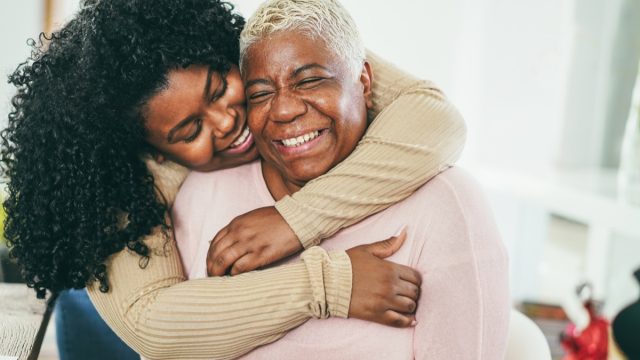
When my kids were little, I was drowning in hugs. Sometimes it felt like one (or both!) of them was attached to my body every waking moment of the day. Plus, I was married to a person who occasionally wanted to hug me, too. Since we all slept together in a family bed, nighttime didn't offer much of a respite from near-constant touch. It bordered on too much even for me, a person whose love language comes up as touch no matter which quiz I take.
These days, as a divorced single mom of two young adults, hugs are harder to come by. When I heard Busy Philipps say recently on her podcast that we need a certain number of hugs each day in order to survive, I had to sit down. Like the frog in warm water who ends up getting boiled to death, I realized that I regularly go days on end without being hugged—or even touched at all. How did this happen? Am I, like the frog, a goner if I don't find a way to get hugs on the daily?
A quick Google search led me to the source: A Forbes article from 2020 (a time when, ironically, many of us were refraining from hugs in order to stay alive) quoted Virginia Satir, "a world-renowned family therapist," as saying that humans need four hugs a day for survival, eight for maintenance, and a dozen for growth.
I decided to ask around and find out for myself how many hugs other people are getting each day—and what therapists and experts say about this "four hugs a day for survival" business. Read on for the results of my investigation.
READ THIS NEXT: 4 Meds That Are Raising Your Blood Pressure, Experts Say.
When it comes to hugs, everyone has different needs.
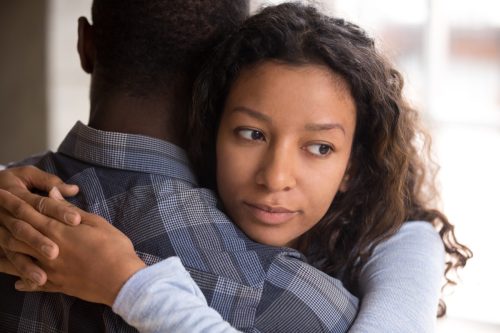
I started off scientifically, by posting a poll on my Instagram story of course. I asked people how many hugs they get per day, and if they felt like it was enough. Answers ranged from, "Never counted, but probably a dozen depending on who I see. It feels like enough and I don't mind more!" to "Zero, but I don't give any either. I'm okay with it. I'm not a hugger."
My envy of the people who said they got plenty of hugs every day was overshadowed by my bewilderment at those who said they didn't like hugs or who merely tolerated them. I reached out to experts for an explanation.
"Not all people enjoy hugs or other physical contact to the same degree," Veronica Hlivnenko, a psychologist and holistic health counselor at InPulse, told me. "Personal preferences, cultural norms, and more can determine it."
Life and wellness coach Carli Dansky, founder of btrue & well, noted that hugging is a vulnerable act, "and the reality is, a lot of us don't like to be vulnerable." She also pointed out that if someone isn't used to getting lots of daily hugs, they may not know what they're missing. (I do know!)
Hugs boost oxytocin, "the feel-good hormone."
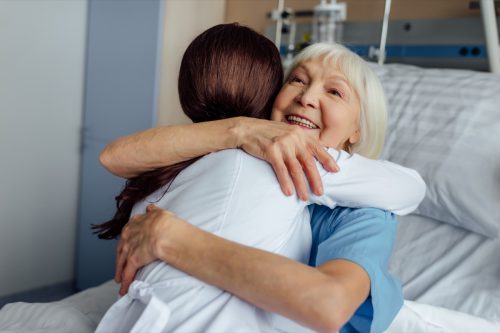
Putting aside how many hugs anyone wants or receives, I pressed on, determined to get to the bottom of whether I was likely to perish from not being hugged. "It's true that you can feel better just by receiving another's affectionate touch," says Faisal Tai, MD, a board-certified psychiatrist and the CEO of PsychPlus. While he would not put a number on how many hugs we actually need, he explained what happens to us when we're hugged (or stroked on the top of our heads, or gently kissed on our foreheads—things I would gladly accept in lieu of, or in addition to, hugs).
Tai explains that we all have receptors in our skin that send messages directly to the brain. "Just think about the last time you were given a hug or a pat on the back, or someone put their arm around your shoulders," he says. "You can get a boost of oxytocin, often referred to as 'the feel-good hormone,' from this sort of physical affection. This hormone promotes positive feelings and builds and maintains a positive outlook, which is why it feels so good!"
Research featured in Biological Psychiatry explains that it's long-lasting too. Tai says the benefits of human touch given to newborns is measurable even 10 years after birth. So maybe I'm okay, if hugs last for a decade? Hmmm.
Hugs might keep us from getting sick.
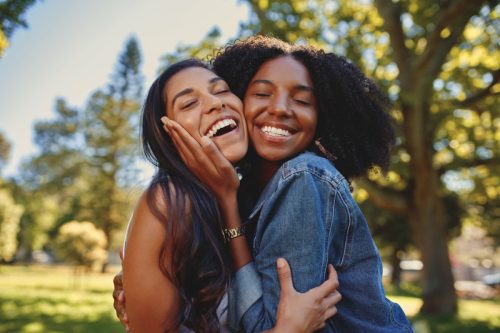
Hlivnenko says hugs can strengthen the immune system—which is definitely a factor in our survival. The reason? It's that feel-good hormone, oxytocin, again.
"Oxytocin possesses immune-enhancing properties, as it suppresses the release of cortisol and promotes reduced stress levels," she explains. "Stress [is seen by] the body as a toxin, overburdening the immune system, compromising its defenses against external stressors like pathogenic bacteria, viruses, and more, and making the body more susceptible to getting sick and taking it longer to recover. Thus, a gentle touch, a friendly hug, or an act of care in a stressful situation can directly strengthen the body's immune responses."
Is it dumb luck, then, that I haven't gotten sick much this year? Or maybe it's all the supplements I take every day—that must be it.
READ THIS NEXT: New "Highly Contagious" Skin Infection Is Spreading, CDC Warns—How to Stay Safe.
Hugs strengthen our sense of connection.
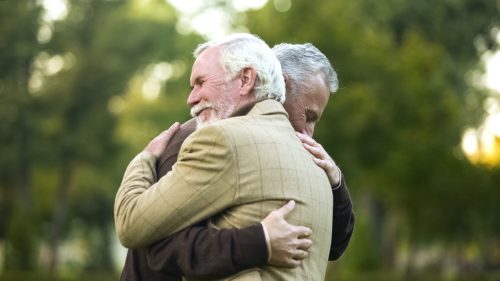
Carrie Hanson, LMFT, LCAS, clinical director at CooperRiis Healing Community, was also reluctant to give me an exact number of hugs I should be getting in order to survive (and thrive!). She did, however, emphasize the importance of touch.
"Although there is no specific number of hugs per day we need, physical touch is very important!" she told me. "We're actually losing the fine art of extending a simple hug, pat on the back, or holding hands to show love and affection. There is science behind touch. What we have found is that theta waves increase with touch, and this prompts relaxation."
Hanson says that when it's welcome, physical touch conveys responsiveness, empathy, kindness, and acceptance. "Overall, a message of 'you're cared for' is expressed with touch."
For more health news sent directly to your inbox, sign up for our daily newsletter.
Hugs don't have to come from humans.

So is a single mom, soon-to-be-empty-nester out of luck when it comes to the health benefits of hugs? Or what about my mom, who is recently widowed? "If you are living alone, having the affection of a pet can serve as a nice replacement to human touch," says Beth Gulotta, LMHC, the owner and founder of NYC Therapeutic Wellness.
Hlivnenko concurs: "Hugging goes beyond human interaction. Snuggling with pets is also shown to stimulate oxytocin release, similar to wrapping your hands around your loved humans." That's good news for my mom and me, since we are devoted cat-moms to our sweet feline friends.
And if our cats aren't willing to cuddle, Hlivnenko suggests taking things into our own hands—literally. "When life gets busy, you have a limited social circle, or just feel uncomfortable about too frequent tactile contact with other people, self-hugging can be a nurturing habit, creating calming brain waves."
The more hugs, the better.

Still, I wanted a number—and when pressed, Hlivnenko gave me one. "The best answer is 'the more, the better.' On a normal day, an average adult may need at least four to five meaningful hugs or other forms of human-induced touch to maintain emotional comfort and a sense of belonging," she said.
Psychologist Shannon Dobbs, co-owner of FOY Wellness and Recovery Center in Agoura Hills, California, weighed in with a number as well. "Anything less than eight hugs a day delivers a void to the system that feels palpable," she told me. "I believe we start feeling the lack of connection and loss of direction. In response to Satir's quote that 'we need 12 hugs a day for growth'—this resonates. When we create the space and opportunity to connect in the physical sense, it becomes easier, and our energy starts to attract more of it in our lives. We start to grow rich in connection in that way. We grow rich in love."
Who else needs a hug?
Best Life offers the most up-to-date information from top experts, new research, and health agencies, but our content is not meant to be a substitute for professional guidance. If you have health questions or concerns, always consult your healthcare provider directly.





















